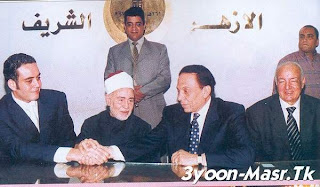انتقدت صحيفة الكريستيان ساينس مونيتور الأمريكية صحيفة الأهرام المصرية على خلفية نشرها خبراً ملفقاً عن مناقشة البرلمان لقانون "معاشرة الوداع"، متهمة الأهرام بممارسة "التضليل الصحفي".
واتهمت الصحيفة الأمريكية الأهرام بأنها منحت الصحافة الصفراء في الغرب مادة دسمة للإساءة للإسلام والمسلمين، سرعان ما تحولت إلى حملة إنتقاد واسعة للإسلاميين وتشهير بـ"إنحلالهم الأخلاقي".
وكانت الأهرام قد نشرت خبراً عن تقدم ميرفت التلاوي، رئيس المجلس القومي للمرأة، بشكوى لسعد الكتاتني، رئيس مجلس الشعب، حول قانون "معاشرة الوداع" الذي يسمح للرجل بمعاشرة زوجته بعد وفاتها، والتي زعمت الأهرام بأنه يتم مناقشته في البرلمان.
وقالت الصحيفة الأمريكية أن كذب الأهرام أفتضح عندما خرجت التلاوي نفسها لتنفي مناقشة أي مشروع عن المعاشرة بعد الموت في البرلمان، ناهيك عن عدم أرسالها أي شكوى بخصوص المشروع الغير موجود أساساً.
وأضافت الصحيفة بأن الأمر ليس مستغرباً فأي شخص يعرف المصريين يدرك أنه لا يمكنه أن يصدق مثل هذا الخبر لأن الحديث عن معاشرة الموتى أمر متطرف بدرجة مضحكة، كما أنه لا توجد أي جماعة إسلامية في مصر تبنت مثل هذا الرأي في أي وقت من الأوقات.
ووصفت ما نشرته الأهرام بأنه محاولة لخلق حالة من الذعر تصب في مصلحة خصوم السياسيين الإسلاميين مع إحتدام سباق الرئاسة وإقترابه من لحظة الحسم.
وأشارت الصحيفة إلى أن الأهرام تخدم مصالح من هم في السلطة، على حد وصفها، لافتة إلى فضيحة "الصورة التعبيرية" التي قامت فيها الأهرام بالتلاعب بصورة صحفية لتجعل الرئيس المخلوع يظهر وكأنه يتصدر كل من الرئيس الأمريكي باراك أوباما، وملك الأردن، والرئيس الفلسطيني محمود عباس، ورئيس الوزراء الإسرائيلي بنيامين نتنياهو خلال محادثات السلام الفلسطينية-الإسرائيلية في واشنطن عام 2010.
واعتبرت أن الخبر الكاذب الذي نشرته الأهرام والذي يصب في مصلحة وزير خارجية نظام مبارك السابق، عمرو موسى، يكشف عن رهانات المجلس العسكري الذي يدير البلاد ويمسك بزمام السلطة.
وقالت الصحيفة ساخرة بأن الأهرام قامت بعد ذلك بالحديث عن "أنباء تدوالتها عدداً من الصحف ومواقع الإنترنت" عن مشروع القانون، مقتبسة من عدد من الصحف الغربية، دون الإشارة إلى أن هذه الصحف نفسها قامت بنقل الخبر عن الأهرام.
وأضافت بأن "الحديث عن الجدل" هي حيلة صحفية معروفة تلجأ إليها صحافة النخبة حينما تريد نشر أحد الأخبار التي تتداولها الصحافة الصفراء بطريق غير مباشر فتقوم بالحديث عن الجدل الذي أثير حول الخبر متجنبة الخبر ذاته، ولكن أن تلجأ الصحيفة لهذه الحيلة للحديث عن خبر كاذب قامت هي نفسها بنشره فإن ذلك إبتكار جديد في عالم الصحافة تملك صحيفة الأهرام المصرية براءة إختراعه، بحسب الصحيفة الأمريكية.
واختتمت الصحيفة قائلة بأنه على الرغم من أن الكثير قد تغير في مصر في أعقاب الثورة التي أطاحت بنظام الرئيس المخلوع حسني مبارك، إلا أن صحيفة الأهرام تثبت يوماً تلو الآخر بأنها لا تزال على ماهي عليه.
واليكم المقال الاصلى لجريدة الكريستيان ساينس مونيتور
Ahead of elections, Egypt's state propaganda machine rolls on
Egypt's government paper Al Ahram was the central arm of state propaganda during the reign of Hosni Mubarak. Ahead of elections, it's taking aim once again at Egypt's Islamists.
By Dan Murphy, Staff writer / April 30, 2012
Last week, Egypt's state-owned newspaper Al Ahram helped kick up an international storm with a bit of dodgy journalism: It ran an opinion piece by Amr Abdel Samea, a former loyalist of deposed President Hosni Mubarak, that stated that Mervat el-Tallawy, the head of Egypt's National Council for Women, had complained that Egypt's parliament was considering a piece of legislation sponsored by Islamists to allow men to have sex with their wives after their death.
Recent posts
The story was translated into English by Al Arabiya, and was quickly picked up by outlets like the Huffington Post and the sensationalist British tabloid The Daily Mail, which distorted the original claim from a proposal to a done deal: "Egyptian husbands will soon be legally allowed to have sex with their dead wives," the tabloid claimed, apparently having misunderstood the original Arabiya translation. The story buzzed around the world, held up in blogs as evidence of the immorality of Islamist politicians. The current version of the Wikipedia article on necrophilia even has a section devoted to the claim.
RELATED: Salafis 101
The problem is that there was never any such proposal, at any stage of consideration, in the Egyptian parliament. Ms. Tallawy issued a statement today that says she's concerned about legislation that may harm the position of women in Egypt, but that there was never any "sex after death law" under consideration, let alone one she complained about. Arabiya followed up as well, quoting Parliament Secretary Sami Mahran as saying no such piece of legislation ever existed.
This is hardly surprising. Anyone who knew Egypt didn't believe it in the first place, since sex with the dead is a laughably extreme position that no Egyptian Islamist group has ever espoused but is exactly the kind of overheated scare-mongering that can be potentially useful for opponents of Islamist politicians as Egypt's presidential campaign heats up.
In the presidential campaign, former Arab League Secretary-General Amr Moussa (who served as Mubarak's foreign minister for a decade) is the old establishment's preferred candidate. His main rivals are former Muslim Brotherhood executive Abdul Moneim Aboul Fotouh and current Brotherhood member, Mohammed Morsi.
Ahram's reporting should be seen within its traditional framework – serving the interests of those in power. That was Mr. Mubarak for decades. Now, it's the Supreme Council for the Armed Forces (SCAF), the military junta that has run Egypt since Mubarak's ouster last February.
Ahram under Mubarak was much like Pravda in the old Soviet Union. Consider the former president's September 2010 visit to Washington for Palestinian-Israeli peace talks. A photographer captured Mubarak, President Obama, Jordanian King Abdullah, Palestinian Authority President Mahmoud Abbas, and Israeli Prime Minister Benjamin Netanyahu walking the red carpet together. Mubarak trailed the whole group, just behind Mr. Netanyahu.
المقال مترجم عن قناة العربية
The parliamentary attacks on women’s rights has drawn great criticism from women’s organizations in Egypt. (File photo)
inShare121
By Abeer Tayel
Al Arabiya
Egypt’s National Council for Women (NCW) has appealed to the Islamist-dominated parliament not to approve two controversial laws on the minimum age of marriage and allowing a husband to have sex with his dead wife within six hours of her death according to a report in an Egyptian newspaper.
The appeal came in a message sent by Dr. Mervat al-Talawi, head of the NCW, to the Egyptian People’s Assembly Speaker, Dr. Saad al-Katatni, addressing the woes of Egyptian women, especially after the popular uprising that toppled president Hosni Mubarak in February 2011.
She was referring to two laws: one that would legalize the marriage of girls starting from the age of 14 and the other that permits a husband to have sex with his dead wife within the six hours following her death.
According to Egyptian columnist Amro Abdul Samea in al-Ahram, Talawi’s message included an appeal to parliament to avoid the controversial legislations that rid women of their rights of getting education and employment, under alleged religious interpretations.
“Talawi tried to underline in her message that marginalizing and undermining the status of women in future development plans would undoubtedly negatively affect the country’s human development, simply because women represent half the population,” Abdul Samea said in his article.
The controversy about a husband having sex with his dead wife came about after a Moroccan cleric spoke about the issue in May 2011.
Zamzami Abdul Bari said that marriage remains valid even after death adding that a woman also too had the same right to engage in sex with her dead husband.
Two years ago, Zamzami incited further controversy in Morocco when he said it was permissible for pregnant women to drink alcohol.
But it seems his view on partners having sex with their deceased partners has found its way to Egypt one year on.
Egyptian prominent journalist and TV anchor Jaber al-Qarmouty on Tuesday referred to Abdul Samea’s article in his daily show on Egyptian ON TV and criticized the whole notion of “permitting a husband to have sex with his wife after her death under a so-called ‘Farewell Intercourse’ draft law.”
“This is very serious. Could the panel that will draft the Egyptian constitution possibly discuss such issues? Did Abdul Samea see by his own eyes the text of the message sent by Talawi to Katatni? This is unbelievable. It is a catastrophe to give the husband such a right! Has the Islamic trend reached that far? Is there really a draft law in this regard? Are there people thinking in this manner?”
Many members of the newly-elected, and majority Islamist parliament, have been accused of launching attacks against women’s rights in the country.
They wish to cancel many, if not most, of the laws that promote women’s rights, most notably a law that allows a wife to obtain a divorce without obstructions from her partner. The implementation of the Islamic right to divorce law, also known as the Khula, ended years of hardship and legal battles women would have to endure when trying to obtain a divorce.
Egyptian law grants men the right to terminate a marriage, but grants women the opportunity to end an unhappy or abusive marriages without the obstruction of their partner. Prior to the implementation of the Khula over a decade ago, it could take 10 to 15 years for a woman to be granted a divorce by the courts.
Islamist members of Egyptian parliament, however, accuse these laws of “aiming to destroy families” and have said it was passed to please the former first lady of the fallen regime, Suzanne Mubarak, who devoted much of her attention to the issues of granting the women all her rights.
The parliamentary attacks on women’s rights has drawn great criticism from women’s organizations, who dismissed the calls and accused the MPs of wishing to destroy the little gains Egyptian women attained after long years of organized struggle.


































